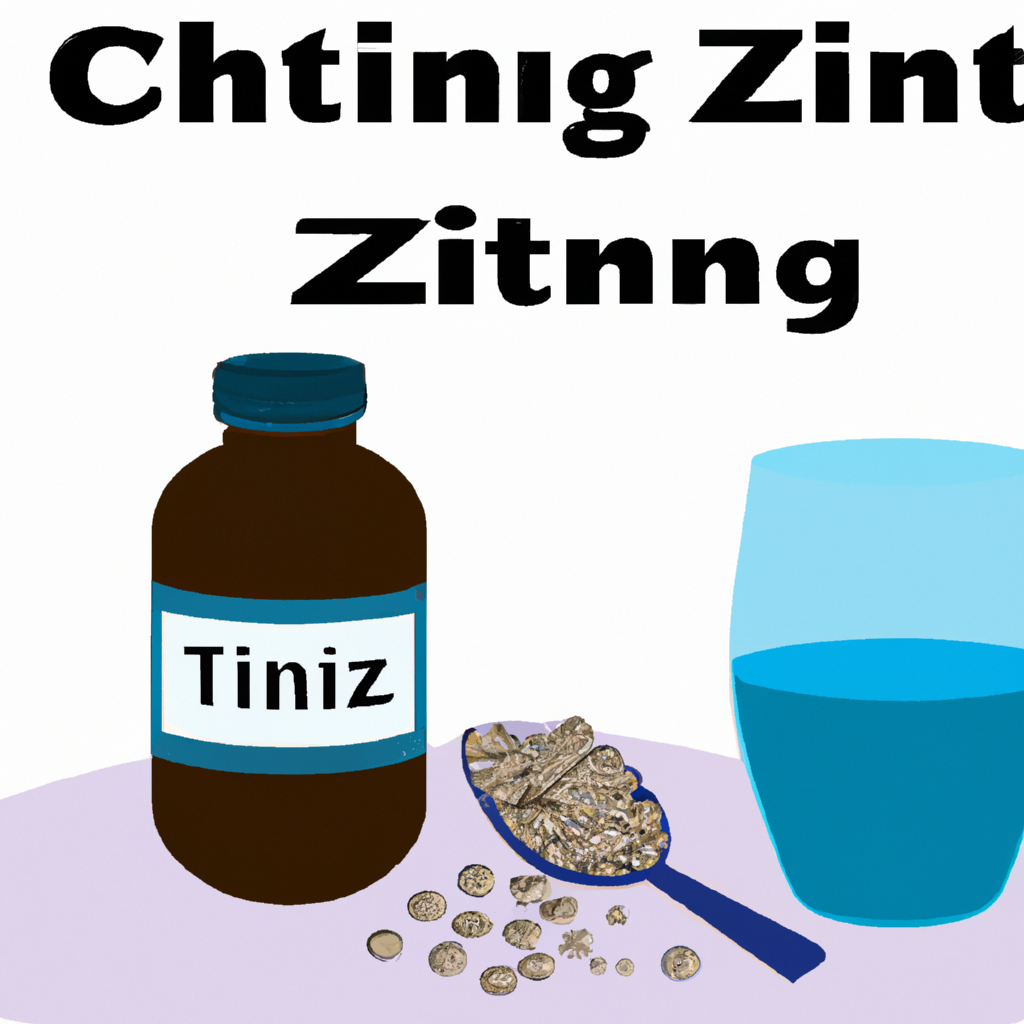You know the importance of maintaining a healthy diet, but have you ever wondered about the role zinc plays in supplements? Zinc, a vital mineral, is often found in multivitamins and other health products. In this article, we will explore the benefits of zinc and why it is an essential component in many dietary supplements. Whether you are considering incorporating zinc in your daily routine or simply curious about its role, read on to discover the power of this mighty mineral.

This image is property of images.unsplash.com.
Understanding Zinc: An Overview
Zinc is a vital mineral that plays a crucial role in various physiological processes in the human body. It is an essential nutrient that our bodies require for proper growth and development. Let’s delve into the definition of zinc, explore its natural sources, and understand why it is necessary for our overall health and well-being.
Definition of zinc
Zinc is a trace element that is naturally occurring in the earth’s crust. It is classified as a transition metal and is denoted by the chemical symbol “Zn” on the periodic table. While zinc is only required by the body in small quantities, its impact on our overall health should not be underestimated.
Natural sources of zinc
Zinc is present in various natural sources, both plant-based and animal-based. Some of the best plant-based sources of zinc include legumes, whole grains, nuts, and seeds. Additionally, certain fruits and vegetables such as spinach, mushrooms, and avocados also contain zinc. For those who prefer animal-based sources, seafood, red meat, poultry, and dairy products like cheese and milk are excellent choices.
The necessity of zinc for the human body
Zinc plays a vital role in numerous physiological processes within the human body. It is involved in the functioning of over 300 enzymes, which are essential for carrying out chemical reactions in our body. Furthermore, zinc is crucial for supporting the immune system, promoting wound healing, DNA synthesis, and maintaining a healthy sense of taste and smell.
Zinc and Human Health
Understanding how zinc interacts with our bodies is crucial in recognizing its importance for human health. Let’s explore the role of zinc in the immune system, its function in metabolic processes, and its influence on cognitive performance.
Role of zinc in the immune system
Zinc is known for its significant impact on the immune system. It plays a critical role in the development and activation of immune cells, such as T cells, which are responsible for recognizing and destroying harmful pathogens. Zinc also helps regulate the production of antibodies, which are essential in combating infections and keeping our immune system strong and healthy.
Zinc’s function in metabolic processes
Beyond its role in the immune system, zinc is involved in various metabolic processes within the body. It is required for proper digestion and metabolism of carbohydrates, proteins, and fats. Zinc also assists in the production of insulin, a hormone that regulates blood sugar levels. Additionally, it plays a key role in gene expression, cell division, and growth.
Influence of zinc on cognitive performance
Zinc has been found to have an impact on cognitive function and performance. It is involved in the structure and function of brain cells and helps maintain healthy neurotransmitter levels. Studies have suggested that zinc supplementation may improve memory, attention, and overall cognitive function, particularly in older adults. However, further research is still needed to fully understand the extent of zinc’s influence on cognitive performance.
Zinc Deficiency
Zinc deficiency occurs when there is an insufficient intake or poor absorption of zinc in the body. It can lead to several adverse effects on our health. Let’s discuss the symptoms of zinc deficiency, the health risks associated with it, and the populations that are most at risk.
Symptoms of zinc deficiency
Recognizing the symptoms of zinc deficiency is crucial for early detection and intervention. Common signs of zinc deficiency include frequent infections, delayed wound healing, hair loss, loss of appetite, impaired growth and development (in children), and changes in taste and smell. Additionally, individuals with zinc deficiency may experience skin rashes, impaired vision, and mood disturbances.
Health risks associated with zinc deficiency
Zinc deficiency can have serious implications for our health. It compromises the immune system, making individuals more susceptible to infections and diseases. It can also lead to delayed wound healing, impair the functioning of the reproductive system, and negatively impact cognitive function. Prolonged zinc deficiency can result in growth retardation, developmental abnormalities, and an increased risk of chronic diseases.
Populations at risk for zinc deficiency
Certain populations are more susceptible to zinc deficiency than others. Infants and young children, pregnant and lactating women, older adults, and individuals with certain medical conditions such as gastrointestinal diseases or malabsorption disorders are at a higher risk. Additionally, vegetarians, vegans, and those with limited access to a diverse diet may also be prone to zinc deficiency.
Zinc Supplementation
Zinc supplementation can be beneficial in situations where individuals are unable to meet their zinc requirements through diet alone. Understanding why zinc supplementation is necessary, the different forms of zinc supplements available, and the proper dosage and timing for supplementation is essential.
Why is zinc supplementation necessary?
Zinc supplementation becomes necessary when individuals are unable to meet their zinc needs through dietary sources alone. This may be due to a restricted diet, poor absorption of zinc, or increased zinc requirements (such as during pregnancy or illness). By supplementing with zinc, individuals can ensure they meet their daily recommended zinc intake and maintain optimal health.
Different forms of zinc supplements
Zinc supplements are available in various forms, including zinc gluconate, zinc citrate, zinc picolinate, and zinc sulfate, among others. Each form differs in terms of bioavailability and elemental zinc content. It is essential to choose a form of supplement that is readily absorbed by the body and contains an appropriate amount of elemental zinc.
Proper dosage and timing for zinc supplementation
The recommended daily dosage of zinc varies depending on factors such as age, sex, and individual needs. For adults, the recommended daily allowance (RDA) for zinc ranges from 8 to 11 milligrams. It is crucial to consult healthcare professionals or a registered dietitian to determine the appropriate dosage and timing for zinc supplementation. It is also important to note that excessive zinc intake can be toxic, so it is essential to follow recommended guidelines.

This image is property of images.unsplash.com.
Absorption of Zinc
Understanding how zinc is absorbed in the body and the factors that can affect its absorption is important to ensure optimal utilization of this essential mineral. Let’s explore the mechanism of zinc absorption, the factors that influence its absorption, and how we can improve the absorption of zinc.
Mechanism of zinc absorption
Zinc absorption primarily occurs in the small intestine. It involves several steps, including binding to transport proteins, crossing the intestinal lining, and entering the bloodstream. Once in the bloodstream, zinc is transported to various tissues and organs where it is utilized for various physiological processes.
Factors affecting zinc absorption
Several factors can influence the absorption of zinc in the body. These include the presence of certain dietary components such as phytates and fiber, which can inhibit zinc absorption. On the other hand, factors like stomach acid, protein intake, and the overall zinc status of an individual can enhance its absorption. It is important to consider these factors when evaluating zinc absorption and overall zinc status.
Improving the absorption of zinc
Certain dietary strategies can enhance the absorption of zinc. Consuming foods rich in animal proteins, such as meat and seafood, can increase zinc absorption due to their content of zinc-binding amino acids. Pairing plant-based sources of zinc with vitamin C-rich foods can also enhance absorption. Additionally, soaking, fermenting, and sprouting certain foods can help reduce the content of zinc inhibitors and promote better zinc absorption.
Zinc and other Nutrients
Zinc does not work alone in contributing to our overall health. It interacts with various other nutrients, such as minerals and vitamins, to ensure proper bodily function. Let’s explore the interaction of zinc with other minerals, its role in vitamin absorption, and the effects of nutrient imbalance on zinc absorption.
Interaction of zinc with other minerals
Zinc interacts with several other minerals in the body, including copper and iron. While copper is required in small amounts, excessive zinc intake can interfere with copper absorption and utilization. Therefore, it is important to maintain a balance between zinc and copper intake. Similarly, iron and zinc can compete for absorption, so ensuring adequate intake of both minerals is crucial.
Zinc’s role in vitamin absorption
Zinc plays a crucial role in the absorption and metabolism of certain vitamins, particularly vitamin A. Zinc is required for the conversion of beta-carotene, a precursor of vitamin A, into its active form. Adequate zinc levels are essential for maintaining optimal vitamin A status and preventing vitamin A deficiency.
Effects of nutrient imbalance on zinc absorption
Imbalances in nutrient intake can affect zinc absorption and utilization in the body. High intake of calcium, phosphorus, or fiber can inhibit zinc absorption. Conversely, excessive intake of zinc can interfere with the absorption of other essential minerals like iron, copper, and calcium. Striking a balance between various nutrients through a well-rounded diet is important for ensuring optimal zinc absorption and overall nutrient status.

This image is property of images.unsplash.com.
Possible Side Effects of Zinc Supplements
While zinc supplementation can be beneficial when used appropriately, it is important to be aware of potential side effects. Let’s explore the common side effects of zinc supplements, the potential risk of zinc toxicity, and the precautions to consider while taking these supplements.
Common side effects of zinc supplements
Some individuals may experience side effects when taking zinc supplements, especially when exceeding the recommended dosage. Common side effects can include nausea, vomiting, diarrhea, stomach cramps, and headaches. These side effects are usually temporary and can be minimized by taking the supplements with food or reducing the dosage.
Potential risk of zinc toxicity
Excessive intake of zinc supplements can lead to zinc toxicity, also known as zinc overdose. Symptoms of zinc toxicity can include abdominal pain, dizziness, fatigue, fever, and impaired immune function. Prolonged excessive intake of zinc can lead to copper deficiency and negatively impact other mineral balances in the body.
Precautions while taking zinc supplements
To minimize the risk of side effects and zinc toxicity, it is crucial to follow proper precautions when taking zinc supplements. It is important to adhere to the recommended dosage guidelines and consult with a healthcare professional or registered dietitian before starting any supplementation. Individuals with certain medical conditions, such as kidney disease or Wilson’s disease, should exercise caution and seek appropriate guidance before taking zinc supplements.
The Role of Zinc in Disease Prevention and Treatment
Zinc’s role extends beyond basic physiological processes. Research has shown its potential in disease prevention and treatment. Let’s explore zinc’s role in infection and disease prevention, its use in treating certain diseases, and the ongoing research on zinc’s role in promoting overall health.
Zinc’s role in infection and disease prevention
Zinc has been found to have a significant impact on the prevention and management of various infections and diseases. It plays a crucial role in boosting the immune system, enhancing immune cell function, and reducing inflammation. Adequate zinc levels have been associated with a lower risk of respiratory tract infections, diarrhea, and even age-related macular degeneration.
The use of zinc in treating certain diseases
Zinc supplementation has shown promise in the treatment of certain diseases and health conditions. It has been used to reduce the severity and duration of the common cold, as well as improve symptoms related to acute diarrhea in children. Zinc supplements have also been studied for their potential benefits in managing age-related macular degeneration, acne, and promoting wound healing.
Ongoing research on zinc’s role in health
Researchers continue to investigate the various potential benefits of zinc in promoting overall health. Ongoing studies are exploring its role in preventing and managing chronic diseases such as diabetes, Alzheimer’s disease, and cardiovascular diseases. Additionally, research is focusing on understanding the interaction between zinc and the gut microbiota, which plays a crucial role in overall health and well-being.

Zinc Supplements Vs. Dietary Zinc
The choice between zinc supplementation and obtaining zinc from dietary sources is a common consideration. Let’s compare the absorption of dietary zinc to supplemented zinc, explore the advantages of dietary zinc over supplements, and discuss the limitations of relying solely on dietary zinc.
Comparing the absorption of dietary zinc to supplement zinc
The bioavailability of zinc differs between dietary sources and supplements. While dietary zinc is typically bound to proteins and is more readily absorbed by the body, zinc supplements can vary in terms of bioavailability. Certain forms of zinc supplements, such as zinc picolinate or zinc gluconate, have been found to be more easily absorbed than others. However, the absorption of zinc from dietary sources is generally considered to be more efficient.
The advantages of dietary zinc over supplements
Obtaining zinc from a well-balanced diet offers several advantages over relying solely on supplements. Whole foods that contain zinc often come with a wide array of other essential nutrients, such as vitamins, minerals, and antioxidants, which work synergistically for optimal health. Additionally, dietary sources of zinc are less likely to cause adverse side effects or complications, as they are naturally occurring and easily regulated by the body.
The limitations of dietary zinc
While dietary sources of zinc can be beneficial, they may not always provide adequate amounts of zinc for certain individuals. Vegetarians, vegans, or individuals with restricted diets may struggle to meet their recommended daily zinc intake through food alone. In such cases, supplementation may be necessary to prevent deficiency and maintain optimal health. It is important to strike a balance between obtaining zinc from dietary sources and considering supplementation when needed.
Zinc Supplementation: Guidelines and Recommendations
When considering zinc supplementation, it is vital to understand the guidelines and recommendations for its proper usage. Let’s explore the recommended daily amount of zinc, specific guidelines for different age groups, and the importance of consulting healthcare professionals before starting supplementation.
Recommended daily amount of zinc
The recommended daily allowance (RDA) for zinc varies depending on age, sex, and life stage. For adult males, the RDA is typically around 11 milligrams, while adult females require approximately 8 milligrams. Pregnant and lactating women may require slightly higher amounts of zinc, with the recommended intake ranging from 11 to 13 milligrams during pregnancy and 12 to 14 milligrams during lactation.
Guidelines for zinc supplementation in different age groups
Specific guidelines for zinc supplementation in different age groups exist to ensure optimal health and prevent deficiency. Infants and children often have different zinc requirements based on their growth and developmental needs. It is important to consult with a pediatrician or healthcare professional to determine appropriate supplementation for infants and children. For older adults, supplementation may be considered to prevent deficiency and promote optimal health.
Consulting healthcare professionals before starting supplementation
Before starting any supplementation regimen, it is crucial to consult healthcare professionals or a registered dietitian. They can assess individual needs, review medical history, and provide personalized recommendations. Healthcare professionals can also advise on potential interactions with medications and assess the risks and benefits of zinc supplementation for individual circumstances.
In conclusion, zinc is an essential mineral that is vital for our overall health and well-being. It plays a crucial role in various physiological processes, including immune function, metabolism, and cognitive performance. Understanding zinc’s importance, recognizing its deficiency symptoms, and considering supplementation when necessary can help ensure optimal zinc levels and contribute to optimal health. Remember to focus on a well-balanced diet that includes zinc-rich foods, and consult healthcare professionals before starting any supplementation. By prioritizing zinc and its role in disease prevention and treatment, we can enhance our overall health and well-being.




